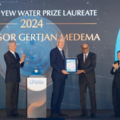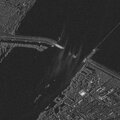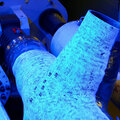Latest news
20 June 2024
Lee Kuan Yew Water Prize for Gertjan Medema

Professor Gertjan Medema has been awarded the Lee Kuan Yew Water Prize 2024 for his groundbreaking research and significant contributions to sewage epidemiology for virus detection in wastewater during the COVID-19 pandemic. His timely research breakthrough enabled the use of wastewater surveillance during the COVID-19 pandemic. President Tharman Shanmugaratnam of the Republic of Singapore presented the Lee Kuan Yew Water Prize medallion to Gertjan Medema. At the beginning of the pandemic, he and his team were the first to detect the presence of SARS-CoV-2 in wastewater in the Netherlands. His research enabled the use of wastewater surveillance during the COVID-19 pandemic to stop the spread of the virus and had a global impact.
17 June 2024
Gauging Antarctica’s sponginess from space

24 May 2024
Remote sensing research reveals pre-collapse monitoring of Kakhovka Dam in Ukraine

New findings from a spaceborne monitoring team of University of Houston, TU Delft and DLR indicates the collapse of the Kakhovka Dam in Ukraine may have been already ongoing before the war with Russia, with deformations in the dam pre-dating the actual collapse. The results were published in the journal Nature Communications Earth and Environment this month.
17 May 2024
Wrapping instead of welding boosts construction endurance

Structures constructed to produce energy offshore have to hold out in rough circumstances. The so-called jacket foundations made of large steel tubes that fixate windmills to the seabed are sensitive to fatigue loading, especially their welded connections. In the near future, the fatigue endurance of this steel construction can be a hundred times better thanks to an innovation by TU Delft of wrapping the joints with composite material, instead of welding them.
14 May 2024
Untapping the hidden resources
13 May 2024
Revolutionising deconstruction: A robot for sustainable material recovery

In response to the need for sustainable construction practices, an international group of researchers has secured a HORIZON Europe grant. They will develop a groundbreaking digitalized, autonomous, and intelligent identification system, including a robot. This innovative technology aims to revolutionize the construction industry by efficiently identifying and extracting reusable materials, products and building components in end-of-life buildings.
26 April 2024
Platforms such as Uber thrive on socio-economic inequality

Platforms that offer rides to passengers, such as Uber and DiDi, thrive on socio-economic inequality. By modelling the behaviour of passengers and self-employed drivers, researchers of TU Delft simulated the market for ridesourcing platforms, evaluating a broad spectrum of (in)equality levels in societies. It explains why in some cities ridesourcing services can be big players in the mobility system, while in other cities they don’t get off the ground. This research was published in Nature Scientific Reports recently.